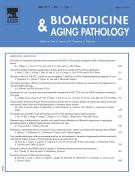Protective efficacy of dietary d-Pinitol on hepatic and renal tissues during experimental breast cancer in rats challenged with 7,12-Dimethylbenz (a) anthracene: A biochemical approach - 08/10/12

Abstract |
Traditionally, dietary compounds have been practiced to eliminate toxins and to strengthen the defense system towards resistance to many disease. d-Pinitol is one of a natural dietary compound predominantly found in soy products. It has been reported to possess diverse biological properties and their therapeutic properties propel them to evaluate against various experimental diseases. We have reported here the protective role of d-Pinitol on renal and hepatic tissue against oxidative stress mediated experimental breast cancer model. DMBA, the polycyclic aromatic hydrocarbon, was used to induce breast cancer in female Sprague Dawley rats with single oral dose of 20mg/kg/body weight diluted in corn oil. The cancer-bearing rats were treated with the natural dietary compound d-Pinitol at the concentration of 200mg/kg/body weight orally for 45days. We observed that d-Pinitol significantly restored the elevated levels of marker enzymes such as ALT, AST and LDH and efficiently down regulates lipid per-oxidation and lysosomal enzymes. The antioxidants levels were found to be significantly enhanced and the carbohydrate key metabolizing enzymes were excellently modulated towards normal range. These biochemical alterations were well reflected in the histopathological studies of liver and kidney tissues of control and experimental groups. Thus, the hepatic and renal tissue protective property might be due to the antioxidant activity which might reduce the per-oxidation reaction that were induced by DMBA and also render protection to the membrane integrity through its firm antioxidant property and modulatory role with prominent intervention strategies in gluconeogenesis process and lysosomal enzymes.
Le texte complet de cet article est disponible en PDF.Keywords : d-Pinitol, LPO, Markers, Antioxidants, Lysosomal enzymes, DMBA
Plan
Vol 2 - N° 3
P. 85-93 - juillet 2012 Retour au numéroBienvenue sur EM-consulte, la référence des professionnels de santé.
L’accès au texte intégral de cet article nécessite un abonnement.
Déjà abonné à cette revue ?

